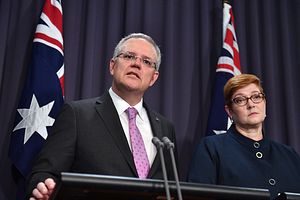Long before Scott Morrison won the job as Australia’s prime minister, he was offered advice on leadership that could very well come to be seen as a defining feature of his foreign policy.
Assuming, that is, he stays around long enough to leave a meaningful legacy.
After August, when the latest round of political bloodletting broke out, the record now stands at six changes in Australia’s top job inside a turbulent decade, and Morrison must face the uncertainty of another national election within the year.
But for the moment, the job and the opportunity are his. Morrison made an early splash in foreign affairs by raising the prospect that Australia could formally recognize Jerusalem as the capital of Israel and review support for the nuclear deal with Iran, a move criticized by opponents as a effort to garner local Jewish community support in a crucial by-election. Yet this close to a national vote, it seems likely that the biggest difference Morrison will bring to the way Australia navigates the world will be one of presentation, rather than a substantive break from the past five years of conservative rule. And here is where Morrison’s approach to leadership will be important.
Morrison’s style was shaped by a moment back in the lonely days of opposition before 2013. It was then, starved of the resources of government, where wit and personal contacts were often crucial ingredients in the quest to claw back power, that Morrison sought out the nation’s last conservative leader, John Howard.
Australia was in the throes of a deeply divisive debate about asylum seekers crossing the rugged seas to the nation’s north, a theme that has dominated the local political scene more than any other in the past 20 years.
The conservatives wielded a potent slogan to attack the then-Labor government: “Stop the boats.” But Morrison wanted the benefit of Howard’s experience. He wanted to answer the question of how, in policy and practice, to get this done.
Morrison had himself never been in government. He won his seat in parliament at a time of Labor ascendency, leaving him to rise in the ranks of opposition as a blunt and often brutal political warrior, but not a proven manager in the byzantine realm of the bureaucracy.
What Howard told him would have an enduring influence.

































